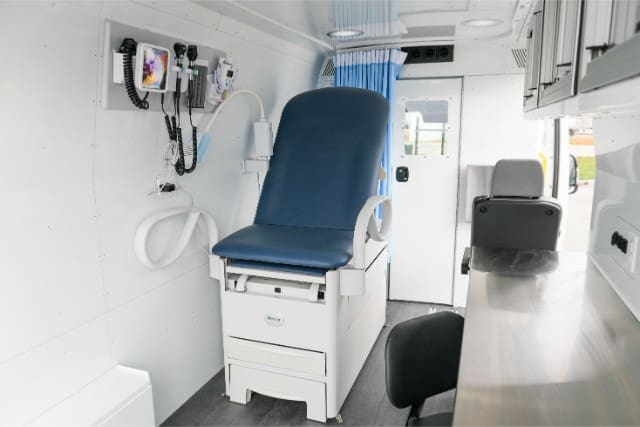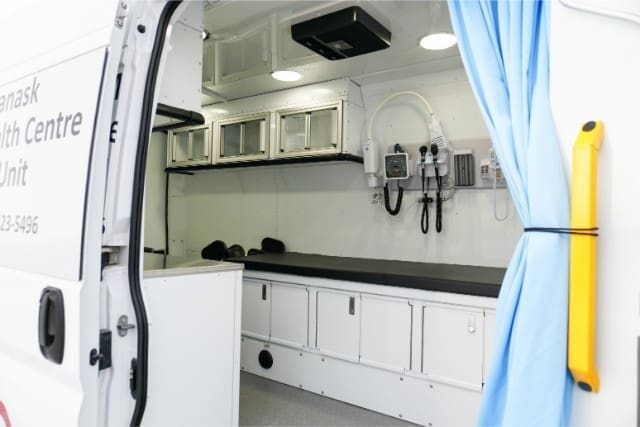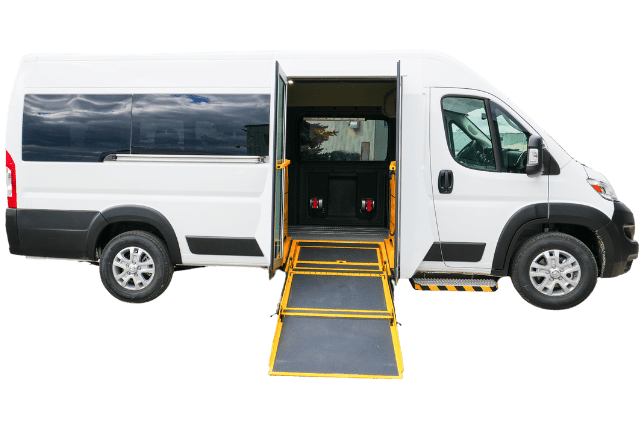Imagine this—your community healthcare centre suddenly loses power, floods, or faces a wildfire. How would you continue providing care to patients? Emergencies can hit fast, leaving patients stranded without access to critical services. This can result in a temporary closure that erodes the trust your community has in your healthcare. No one expects the worst, but what happens if it does?
Here’s the challenge: many community health centres in Canada don’t have a plan to stay operational during a crisis. Without a reliable backup, patient care can grind to a halt. The good news? Mobile clinics offer a practical solution to this gap, keeping services available when fixed facilities can’t.
At MoveMobility, we’ve spent over 20 years designing a variety of mobile medical units to help Canadian healthcare providers like Quest Community Health Centre reach patients when and where it matters most. From remote areas in Northern Manitoba to urban hubs like Vancouver, we’ve seen how mobile clinics break down barriers to care—especially in emergencies. While we’re experienced in building these solutions, we understand we’re not the only option out there.
This article will explain how mobile medical clinics can help your healthcare centre stay prepared for emergencies, continue delivering care, and protect both your patients and your bottom line.
How would your community health centre manage during an emergency?
What if your community healthcare centre suddenly couldn’t open? Patients are lined up outside, but the lights won’t turn on. The phones are silent, and medical equipment won’t work. Or maybe a broken water pipe floods the building, leaving you no choice but to cancel appointments for the day—or longer.
Now think bigger. Imagine a wildfire sweeping through Alberta, forcing road closures and evacuations. Even after the danger passes, your patients are busy rebuilding their lives, not booking checkups. Patient visits slow down, and your services stall just when people may need them most.
The truth is that emergencies don’t have to be massive to cause major problems. In Canada, snowstorms in Manitoba, floods in Quebec, or even unexpected power outages in small towns can bring clinics to a standstill. These situations leave healthcare providers scrambling to keep doors open—and patients without access to care.
Let’s take a look at some of the emergencies that could cause your community health centre to temporarily shut down.
What problems could shut down your community health centre?
We all know how suddenly emergencies can happen and turn things from bad to worse. As we mentioned earlier, it doesn’t always take a big disaster to shut things down. Even small problems can leave you unable to care for patients.
Here are a few examples:
Frozen pipes in winter: In cold places like Winnipeg or Thunder Bay, pipes can freeze and burst, leaving your clinic without running water. That means no bathrooms, no handwashing, and no way to stay open.
Roof leaks after heavy rain: Spring storms in Ontario or Quebec can lead to roof leaks, turning exam rooms into wet, unsafe spaces that can’t be used.
Gas leaks: A sudden gas leak can force everyone to evacuate, and you might not be able to reopen until repairs are made and safety inspections are complete.
Road closures: In remote areas of British Columbia or Newfoundland, landslides or accidents can block access roads, keeping both staff and patients away from the clinic.
Computer system failures: A cyberattack or equipment breakdown could take down scheduling systems and patient records, making it impossible to manage appointments or access medical files.
How do these problems affect your community health centre?
Emergencies might not just shut your doors for a day—they can cause lasting problems that take weeks or months to fix.
Here’s what could happen:
Missed care: Patients may skip important checkups or treatments, which could make health problems worse.
Longer wait times: After reopening, there might be a rush of patients needing rescheduled care, putting added pressure on staff and resources.
Losing trust: If patients can’t count on you during tough times, they might go somewhere else—or stop getting care at all.
Big emergencies can be even harder to bounce back from. After floods in Calgary, some clinics saw fewer patients for months because people were focused on rebuilding their homes and lives.
So, how can you keep providing healthcare during an emergency?
A mobile clinic could be the answer. Instead of waiting for repairs, you can take healthcare to your patients—even if your building isn’t usable. It’s a smart way to stay open and keep your community healthy when unexpected problems hit.
How can mobile clinics keep healthcare running during emergencies?

When an emergency strikes, it’s easy to feel like there’s no way to keep helping patients. But there is. A mobile clinic lets you bring care to your community, even if your main building is shut down.
Here’s how a mobile clinic can help during an emergency:
Your neighbourhood has to evacuate: A gas leak or fire forces businesses to close, but your mobile clinic can move to a safe spot and keep seeing patients.
Flooding damages your building: While repairs are underway, your mobile clinic works as a backup space so appointments don’t get canceled.
Snowstorms block roads: Bad weather makes it hard for patients to reach your building, but your mobile clinic, equipped with the Trail Edition Upgrade, can park closer to where people live.
Your roof needs repairs after a storm: Instead of waiting weeks for fixes, your mobile clinic keeps care going without big delays.
Power outages shut everything down: If your building loses power, your mobile clinic can step in with its own equipment to keep things running.
As you can see, emergencies don’t have to stop you from helping your patients. A mobile clinic gives you a backup option, so care doesn’t have to wait. It’s a flexible, reliable way to keep your services going—no matter what’s happening with your building.
What mobile clinic features make it such a good backup solution during emergencies?
Mobile clinics are designed to feel familiar to patients while giving staff the tools they need to keep providing care—no matter where they are. Mobile clinics come loaded with features that make them perfect for handling healthcare during shutdowns. Let’s take a look at some of their features.
| Feature | How it helps |
| Built-in power supply | Keeps medical devices, lights, and equipment running without needing an external power source. |
| Climate control (heat & A/C) | Ensures the space stays comfortable for patients and staff in both summer heat and winter cold. |
| Optional sink and fridge | Provides sanitation and safe storage for medications to meet health and safety standards. |
| Mobile office space | Includes a desk and storage for managing schedules, patient records, and administrative tasks. |
| Patient bed with storage | Offers a comfortable exam area and extra space underneath to store medical supplies and tools. |
| Floor-to-ceiling cabinetry | Keeps everything organized and within reach, from medical equipment to paperwork. |
| Wipe-clean surfaces | Makes cleaning and sanitizing quick and easy to keep the space safe and hygienic for patient care. |
Mobile clinics are flexible solutions that are ready to go and come with everything you need to provide healthcare. You can park them anywhere, so care doesn’t have to stop. A mobile clinic is a fantastic way to keep helping your community when emergencies pop up. It’s great for quick fixes or even longer-term solutions!
Want to learn more about mobile clinics?
We understand how stressful it can be to think about sudden closures. Flooding, heating failures, or bigger emergencies can shut down your healthcare centre fast. When that happens, patients miss care, and your services are put on hold.
Now you know there’s a solution—a mobile clinic can keep you running, even if your building can’t. It’s like a doctor’s office on wheels, fully equipped to treat patients and keep your staff working. Whether you need a short-term fix or a long-term plan, mobile medical units give you the backup you can count on.
At MoveMobility, we’ve spent years helping Canadian healthcare providers stay prepared and keep care going. Our mission is to remove barriers to healthcare so no one gets left behind. If you’re ready to talk about mobile clinics, click the button below to connect with one of our experts.
Not quite ready? No problem! We’ve got more resources to help you learn how mobile clinics work. A great place to start is by watching the video below that highlights five steps to starting your mobile clinic.
After that, you might also be wondering what customization options are possible with mobile clinics. Watch the video below to learn more about that.





